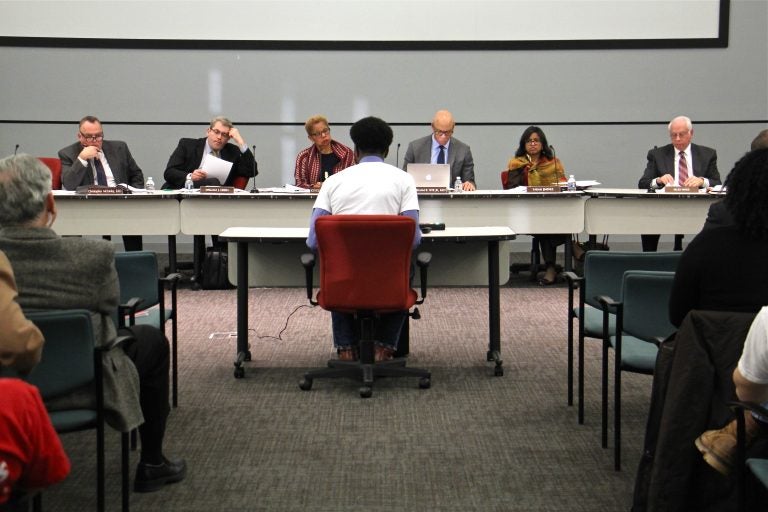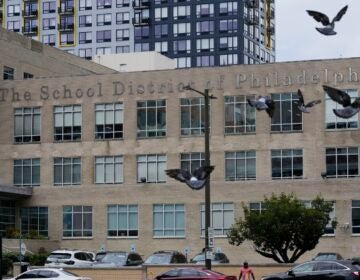With SRC on the brink, Philly charter schools in ‘wait-and-see’ mode
With the SRC seemingly on its way out, charter school advocates aren't sure what to make of a return to local control. Some welcome the shakeup, but others urge caution.

Kileeo Wideman testifies on behalf of Deep Roots Charter School before the School Reform Commission. (Emma Lee/WHYY, file )
While some public school observers cheer the potential dissolution of Philadelphia’s School Reform Commission, charter advocates have taken a more muted tone.
“We’re at a ‘wait-and-see’ point right now,” said Stephen DeMaura, executive director of Philadelphia School Advocacy Partners, a pro-charter lobbying group.
For the first time since the SRC began 16 years ago, there seems real momentum toward disbanding it and replacing the five-member body with a local school board. Politically progressive organizations and politicians have spearheaded the push against the SRC. Voices from the city’s large and growing charter sector have been noticeably quieter.
One could confuse that silence for opposition, but charter advocates say they aren’t organizing against theoretical governance changes. They just aren’t sure what to make of those changes.
“Look, it’s gonna happen,” said David Hardy, founder of Boys Latin Charter School and a vocal charter proponent. “I’m not sure I don’t want it to happen.”
If the SRC dissolves, the board that replaces it would oversee the city’s 86 charter schools, vet future applications, and parse expansion proposals. That means there’s plenty at stake for the school choice community.
Those stakes, however, haven’t translated into strong opinions.
“I think it could be good,” said Marc Mannella, CEO of the five-school KIPP Philadelphia network. “I think it could be bad.”
A ‘reform’ commission no more?
This ambivalence might surprise those who have often argued the SRC has been too cozy with charters. But Mannella and others say the commission has grown less reform-minded in recent years. Some welcome the idea of a shakeup.
“The SRC, when it started out, was about innovation. It was about taking risks,” said Hardy. “Educational energy in the city has waned.”
In its early days, the SRC turned over 20 city schools to the for-profit management company Edison Schools Inc. The commission’s first superintendent hire was Paul Vallas, an energetic (and divisive) reformer who has also had stops in Chicago and New Orleans.
The SRC has also overseen a massive charter expansion. When the commission began in December 2001, Philadelphia had 37 charter schools. Today, the city’s 86 charters make it one of the most charter-dense school districts in the United States.
But attributing that expansion solely to the SRC ignores some key facts. First, national charter enrollment exploded over the last 15 years, and Philadelphia was one among many urban school districts where school choice flourished.
Second, the period of Philadelphia’s greatest charter growth — as measured by the number of new schools opened — happened before the SRC took control.
It was Philadelphia’s last locally appointed school board, in fact, that oversaw the most significant period of charter expansion — which took place from 1998 to 2000.
Year |
Charters Opened |
| 1997 | 4 |
| 1998 | 7 |
| 1999 | 12 |
| 2000 | 10 |
| 2001 | 4 |
| 2002 | 6* |
| 2003 | 4 |
| 2004 | 4 |
| 2005 | 3 |
| 2006 | 1 |
| 2007 | 7 |
| 2008 | 2 |
| 2009 | 6 |
| 2010 | 7 |
| 2011 | 6 |
| 2012 | 4 |
| 2013 | 3 |
| 2014 | 0 |
| 2015 | 1 |
| 2016 | 6 |
| Total | 97 |
*All schools opened from 2002 onward opened during the SRC era.
More recently, more than a dozen charters have clashed with the SRC’s Charter Schools Office over the terms of their charter agreements. The district has also suspended its Renaissance Charter initiative, an especially aggressive form of school reform where charter operators took over district schools.
Given that context, some charter advocates welcome the idea of a new vision.
“The mayor seems open to listen to ideas,” said Hardy. “I’m sure ideas are going to be put in front of him.”
But where does Kenney stand?
The uncertainty percolating among charter advocates stems mostly from their uncertainty around Mayor Jim Kenney.
If the SRC is replaced by an appointed school board, the mayor will have unprecedented power in shaping the city’s educational future. For most of its existence, the school board that preceded the SRC had staggered terms, meaning no one mayor controlled who served on it. Kenney would get a blank slate.
Would he appoint charter-friendly board members? Anti-charter crusaders? A mix?
His history on school choice offers conflicting evidence.
Kenney, who once served on the board of Independence Charter School, in the early 1990s supported school vouchers. More recently, though, he’s supported policies and positions less friendly to charter expansion.
During his mayoral campaign, Kenney said he opposed all charter expansion until the state agreed to reimburse the school district for students lost to charter schools. He also picked up a primary endorsement from the city’s teachers union, a frequent opponent of charter growth.
His campaign policy team included a school district principal, a charter leader, and a Catholic school head — hardly much of a tell.
The state still does not give school districts money when they lose students to charter schools. Asked if the mayor continues to oppose charter expansion under these conditions, mayoral spokeswoman Lauren Hitt offered the following statement, which seemed to soften Kenney’s position.
“The mayor still believes that it is critical that the state fix the way that charter schools are funded. Otherwise, both district and charter schools will continue to fight over an ever shrinking pool of funds and both will suffer,” Hitt wrote. “In the interim, the mayor’s focus will be on creating quality schools – whether they’re district or charter isn’t the priority. That means he will make tough choices about underperforming district and charter schools and look to expand opportunities in top performing schools.”
Hitt said Kenney has talked with “many people in the charter community” about the SRC’s future, and believes city leadership could help ease the “unhealthy debate between charter schools and traditional district schools.”
Even among charter advocates, there’s vague disagreement on where Kenney stands.
DeMaura of Philadelphia School Advocacy Partners is “cautiously optimistic” about Kenney’s approach to school choice. Laura Byers, founder of Russell Byers Charter School and chair of the group Philadelphia Charters for Excellence, feels the mayor leans ever so slightly toward the charter-skeptic side of the policy continuum. But she admits, it’s tough to tell.
“Do I know that as an absolute fact? No, I don’t,” she said, emphasizing she was speaking for herself and not her organization. “But that’s my perception.”
DeMaura said Kenney’s early actions on school choice will be a critical signal to the charter community.
“I think his initial remarks on this will be very important,” he said.”They’ll set the tone for the next couple months as we move down this path.”
Charters seek representation
One thing school choice supporters seem to covet is some form of sector representation on a new school board. They note that a third of the city’s public school students attend charters and should be represented in kind.
“If this comes to pass, I do believe there should be representation for all the different kinds of schools,” said Mark Gleason, head of Philadelphia School Partnership, a prominent backer of charter schools. “I don’t know exactly what that looks like.”
When Kenney was running for mayor, he criticized a proposed $25 million donation from Philadelphia School Partnership to the school district, calling it a “Trojan horse” for runaway charter growth. At the time, Kenney positioned himself in opposition to state Sen. Anthony Hardy Williams, whose campaign received major backing from charter advocates.
But Gleason sees potential in a city-led school district, believing it could unify all sectors of government around a common vision for local schools.
“It’s … a big opportunity, if the mayor follows through and wants this to be about the city taking charge of its educational future,” Gleason said.
Ultimately, however, shifts in local governance can only change so much for the city’s charter sector. State law dictates much of the charter approval and removal process.
“I don’t know how much a governing body or the beliefs of one person will impact the fact that the charter law makes it way too hard to close a charter school,” said Mannella of KIPP.
Mannella said he hasn’t heard a ton of chatter among charter leaders about the SRC, suggesting to him that it isn’t top of mind.
“I think that the absence of that at some level tells you really it’s the [state] law” that matters most, Mannella said.
In a statement, the head of the Mastery Charter School network, Philadelphia’s biggest, captured the neutrality that seems to pervade much of the charter sector.
“All of our children deserve a great education, no matter where they live, and we look forward to working with whatever governing body is in place to accomplish this goal,” wrote Mastery CEO Scott Gordon.
WHYY is your source for fact-based, in-depth journalism and information. As a nonprofit organization, we rely on financial support from readers like you. Please give today.





